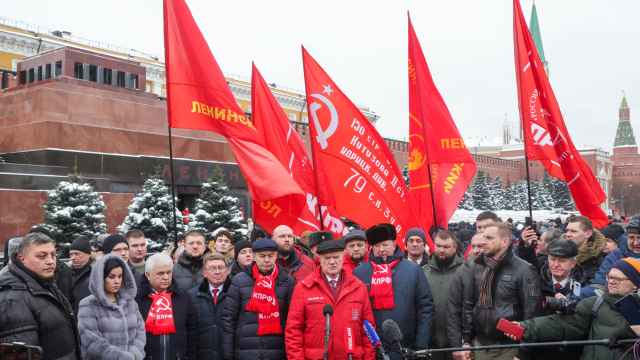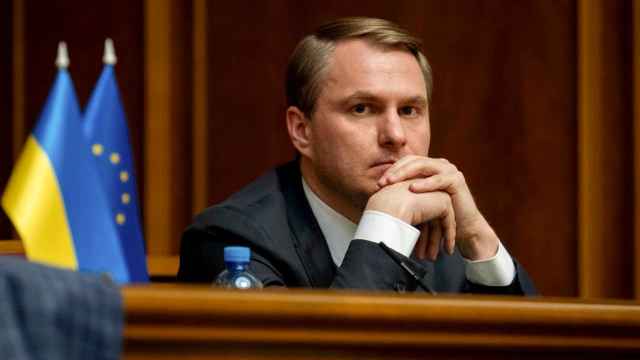The price of Urals crude oil, Russia's key export and the lynchpin of its government finances, fell below $100 this week for the first time in more than a year, after plummeting $15 in under a month.
Russia relies on hydrocarbon exports for 50 percent of its budget. Already squeezed by Western sanctions over Ukraine and balanced on the edge of recession, a sudden collapse in oil revenue looks like bad news for the economy.
But both the Russian government and the country's oil majors will easily weather the price drop — provided it is temporary, analysts said Tuesday.
Urals was trading on Tuesday at just below $97 per barrel, but "an economic slowdown will start at $95. If the price were to fall to $80 per barrel it would prompt a crisis, causing further capital outflows, weakening the ruble and pushing investment levels down in the oil industry and related sectors of the economy," said Valery Mironov, chief economist at Higher School of Economics' Center for Development.
The price of Urals has averaged about $110 per barrel so far this year, and the sudden dip below $100 would have to last some time to bring that average down. The Finance Ministry expects a small budget surplus at an oil price of $104 per barrel.
Moreover, a weak ruble is helping minimize the damage. Oil is sold in dollars, and each dollar now buys 10 percent more rubles than at the beginning of the year, helping shore up government revenue.
Taken by Surprise
The sudden low prices came as a surprise, Mironov said, as most experts, both in Russia and abroad, predicted $105 per barrel on average in the short to medium perspective.
But fears that violence in Ukraine, Iraq and Libya would cause major supply disruptions are ebbing. Indeed, Russia's No. 2 oil company LUKoil announced Tuesday its first oil delivery from its Iraqi oil field. At the same time, global supply is abundant and weaker than expected growth in Europe, the U.S. and China means lower demand.
According to Reuters, every $1 fall in the oil price wipes about $1.4 billion off Russian federal tax revenues. That reduces the government's ability to spend and invest, but the investment programs of Russia's big oil companies will also come under the hammer if the oil price does not bounce back, said Andrei Polischyuk, an oil and gas analyst at Raiffeisenbank.
"All large investment projects [of Russian oil companies] are based on estimates of growing, not falling oil prices," he said.
Directly hit would be Russia's biggest oil producer Rosneft, which has several costly investment projects like drilling for oil in the Arctic and is burdened with almost 1.5 trillion rubles ($44 billion) of debt, according to its first half report.
Rosneft has also been locked out of Western capital markets by U.S. sanctions over Russia's involvement in Ukraine, damaging its ability to refinance debt coming due. While other oil companies have not been directly targeted, the cost of international borrowing has risen sharply for Russian firms across the board. Russia's banks do not have the ready cash to finance the country's vast oil industry.
Rosneft's share price rose by 1.2 percent in Moscow on Tuesday. LUKoil shares were up 1 percent.
Just a Blip
In the longer term, the oil price is more likely to rise than fall, analysts said. Prices are reacting more to the geopolitical situation than to real economic factors, said Denis Davydov, chief analyst at Nordea Bank.
Demand will remain high enough to match supply, and even the abundance of new volumes promised by the U.S.-led shale oil boom is unlikely to push prices down.
"Shale oil production is more expensive than conventional oil extraction methods. Besides, as time goes by there will be less easy-to-reach resources, which means its production costs will only increase, bringing up the prices," said Alexander Pasechnik, the head of analytical department at Moscow-based National Energy Security Fund.
Pasechnik predicted that the oil prices by the end of 2014 would be higher on average than in the previous year.
Polischyuk's employer, Raiffeisenbank, estimates that oil prices will stay as high as $120 per barrel on average in 2015 and grow to $125 in 2016.
See also:
Crash in Oil Prices Deals Blow to Sanctions-Hit Russian Economy
Contact the author at [email protected]
A Message from The Moscow Times:
Dear readers,
We are facing unprecedented challenges. Russia's Prosecutor General's Office has designated The Moscow Times as an "undesirable" organization, criminalizing our work and putting our staff at risk of prosecution. This follows our earlier unjust labeling as a "foreign agent."
These actions are direct attempts to silence independent journalism in Russia. The authorities claim our work "discredits the decisions of the Russian leadership." We see things differently: we strive to provide accurate, unbiased reporting on Russia.
We, the journalists of The Moscow Times, refuse to be silenced. But to continue our work, we need your help.
Your support, no matter how small, makes a world of difference. If you can, please support us monthly starting from just $2. It's quick to set up, and every contribution makes a significant impact.
By supporting The Moscow Times, you're defending open, independent journalism in the face of repression. Thank you for standing with us.
Remind me later.






